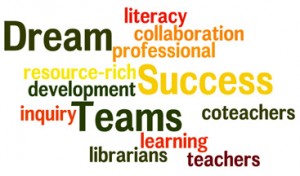Once again, I am always amazed at coincidences that happen from day to day. In the final module for the professional development course I am facilitating this semester at UVM, we are focusing on literacy leadership and advocacy. Part of the required reading and discussion has centered on developing PLNs for professional practice. For teacher librarians in the field, PLNs are critical for keeping current and for communication and collaboration, and they also provide opportunities for advocacy.
Personal Learning Networks are lifelines for staying connected in this wild Web 2.0 world. Establishing a PLN enhances professional development, lifelong learning, and opportunities for collaboration, locally, nationally, and globally. It’s especially important for those of us in the profession who are sole practitioners in a building, or even serving multiple schools in a whole district. A PLN has potential as a support system for anyone who wants to reach out and converse and collaborate with other folks who have similar interests and challenges, and may have different views to share.
Getting back to the coincidence I mentioned, as I was polishing off the module and preparing to post it to the Blackboard site, the mailman delivered the November/December 2012 issue of Knowledge Quest. To my very pleasant surprise, the theme for the issue was “Personal Learning Networks.” I quickly added it as a resource for the module, and what a resource it is!
Not only does the print issue offer a range of articles that cover a variety of possible advantages of using PLNs in professional practice, but the links on the AASL website provide lots of other resources to explore. If you are a member of AASL (another reason to join), you have access to the print and online editions of the publication, support materials, webinars, and social networking sites. If you don’t belong, you can still have access to many of the resources online.
To get started here are some recommended highlights from the Knowledge Quest website: http://www.ala.org/aasl/aaslpubsandjournals/knowledgequest/archive/v41no2
- Table of Contents: Check out the awesome articles in the print edition. There is a direct link for AASL members for the online edition, or if you have access to online databases through your school or public library, you can find KQ articles indexed in several of them. They are a gold mine.
- Carolyn Jo Starkey: Guest editor column, “Going for PLN Gold in the Professional Development Olympics;” and “21 Resources to Kick Start a Gold Medal PLN.” (Active links to getting a PLN up and running asap, or to tune up your PLN)
- Nikki Robertson: “Content Curation and the School Librarian” (online special)
- KQ Webinar-coming soon: “Making the Most of Professional Learning Communities” Tuesday December 12, 2012 at 7:00 PM EST.
- 30 Second Thought Leadership: Jennifer LaGarde and Liza Perez. “What makes personal learning networks critical for professional development?”
And coincidentally, if you have not jumped in and set up a site for curating your favorite websites, blogs, nings, twitter and rss feeds, and so on, as Jennifer LaGarde says, “What are you waiting for?”
Resources:
“Personal Learning Networks”, American Library Association, November 14, 2012. http://www.ala.org/aasl/aaslpubsandjournals/knowledgequest/archive/v41no2 (Accessed November 25, 2012)
“30 Second Thought Leadership”, American Library Association, February 21, 2012. http://www.ala.org/aasl/aaslpubsandjournals/knowledgequest/aboutkq/30second (Accessed November 25, 2012)



